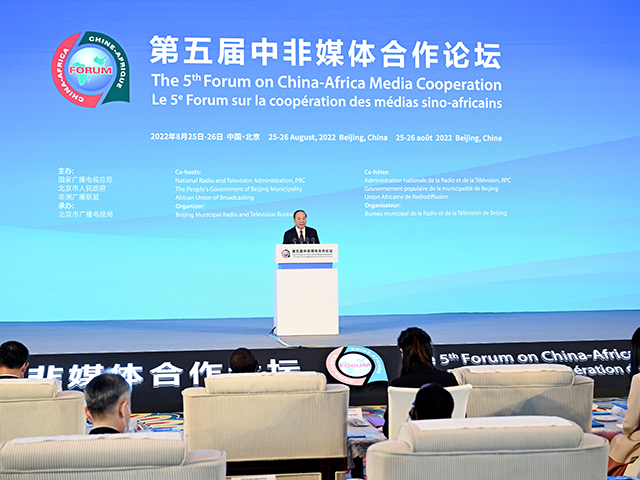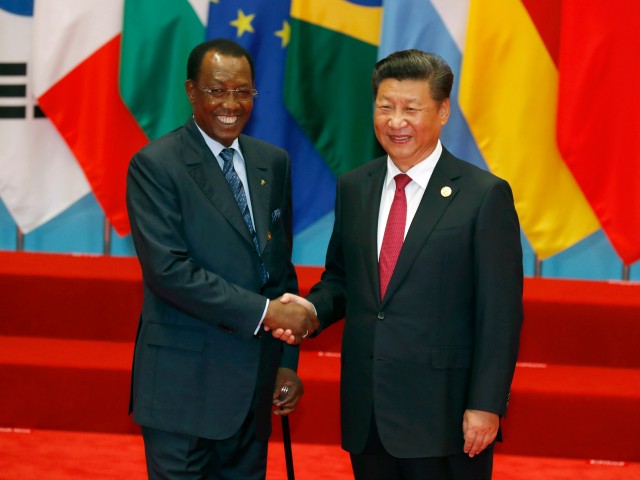China Makes Move to Increase Influence on African Media
Cooperation” virtual forum on Thursday from Beijing, the Global Times reported, noting that delegates from both sides agreed to foment “an international public opinion atmosphere of cohesive development” between Beijing and 40-plus African nations and regions.
Huang Kunming, who leads the Chinese Communist Party’s Publicity Department, presided over the forum on August 25. During the event, Huang gave a short speech in which he “called on Chinese and African media to play a significant role in deepening China-Africa friendship and enhancing people-to-people bonds.”
“He also expressed hope that the two sides’ media would speed up practical cooperation and actively create an international public opinion atmosphere of cohesive development and collaboration,” according to the Global Times.
Huang is a member of the Political Bureau of the Chinese Communist Party’s Central Committee, which owns the Global Times.
China’s National Radio and Television Administration cohosted Thursday’s forum along with the Beijing municipal government and the African Union of Broadcasting. More than 240 delegates attended the event representing either the Chinese Communist Party or Africa. The Global Times did not specify which African countries and regions sent delegates to the event, only stating that more than 40 such entities were represented. The newspaper did name Ibrahima Sory Sylla, the Ambassador of Senegal to China, as a participant of the forum.
The 5th Forum on #China_Africa Media Cooperation opened on August 25th 2022 in #Beijing. This year's edition is a co-host BTW the Government of the People's Republic of China, the National Radio and Television Administration (NRTA) and the African Union of Broadcasting. pic.twitter.com/KQxgINZPsI
— African Union Of Broadcasting - UAR (@UnionUar) August 25, 2022
Senegal is among dozens of African nations that belong to Beijing’s Belt and Road Initiative (BRI). China’s central government funds infrastructure development projects in low-income or impoverished countries through the program. The Chinese Communist Party often bases such transactions on dubious loan structures that have the propensity to plunge financially weak states into debt to Beijing. Observers have criticized BRI loans not only for their economically predatory nature but also for placing member states in precarious positions in which their governments are susceptible to political exploitation. Beijing often uses its BRI projects as platforms on which to advertise the political agendas of the anti-Western Chinese Communist Party.
This was evidenced on November 28, 2021, when Xinhua, China’s official state press agency, reported that Senegal President Macky Sall stated the following during a BRI meeting with Chinese Foreign Minister Wang Yi in Beijing, “The unjust international order should be changed and the future of Africa should be kept in its hands.”
The BRI counted 39 member states from sub-Saharan Africa as of March 2021, according to a report by the Council on Foreign Relations (CFR). The U.S. think tank observed that the program’s 139 total members, including China, “account for 40 percent of global GDP. Sixty-three percent of the world’s population lives within the borders of BRI countries.”
The Media Alliance of Zimbabwe, which is a BRI member state, accused the Chinese Embassy in Zimbabwe of “threatening” a local newspaper called the Standard in July after it published articles about alleged “violations by Chinese mining companies,” Voice of America (VOA) reported. The Standard referred to a statement issued by the Chinese Embassy in Harare on July 11 in which it said it planned to pursue “strong countermeasures” against the Standard and a U.S.-based NGO called Information for Development Trust (IDT) for allegedly promoting what Beijing described as fabrications and “anti-China news.”
The Standard had reported on alleged “violations” by Chinese-owned and operated mining companies in Zimbabwe, which are representative of dozens of mining sites established throughout Africa by Beijing’s BRI. Africans have regularly accused Chinese nationals managing such mining sites of violating their labor rights or of blatant physical violence. Some of the African accusers have been legitimate mine employees while others have been illegal miners.
The Institute for Security Studies (ISS) accused Chinese nationals of creating dangerous work environments for their African laborers in a June 30 report. Two years prior, in June 2020, a Chinese manager of a gold mine in central Zimbabwe allegedly shot and injured two African ex-staff after they demanded back wages. A court in Rwanda, another BRI member, sentenced Chinese national Sun Shujun to 20 years in prison in April after convicting him of torturing two African miners in August 2021 at a Chinese-owned mine he managed.
Source: Breitbart







